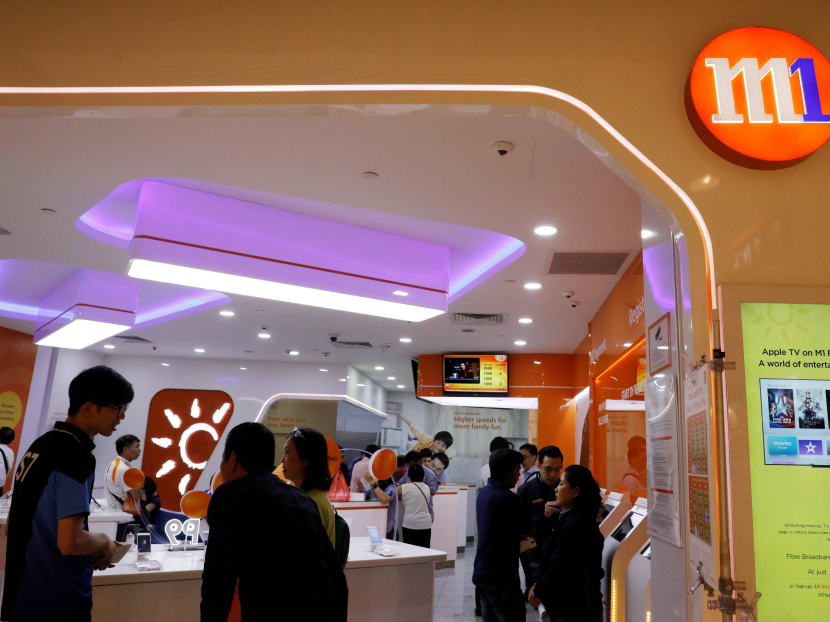From 19 to 2: M1 revamps to offer ‘simpler, customisable’ mobile plans
SINGAPORE — If you cannot beat them, join them. As competition from mobile virtual network operators (MVNOs) intensifies, telco M1 took a leaf out of their book by offering customisable and simpler mobile phone plans instead of having several.

Telecommunications analysts say M1's move to overhaul its offerings to customers is being driven in part by the arrival of mobile virtual network operators in Singapore.
SINGAPORE — If you cannot beat them, join them. As competition from mobile virtual network operators (MVNOs) intensifies, telco M1 took a leaf out of their book by offering customisable and simpler mobile phone plans instead of having several.
On Tuesday (May 28), it unveiled two new base plans that can be customised based on a user’s own needs. As part of the major revamp, it is also dropping 19 of its previous plans, although existing customers would not be affected.
Telecommunications industry analysts believe that besides responding to competition from MVNOs, M1’s mobile plan offerings could help it protect and perhaps gain market share, instead of relying on its MVNO partner Circles.Life for growth in the lower-end of the mobile phone market.
Mr Kenny Liew, an analyst at financial research firm Fitch Solutions, said that the entry of MVNOs in Singapore had “uprooted the entire industry”. MVNOs such as Circles.Life and MyRepublic are small operators that buy wholesale network space and sell it to retail customers.
Circles.Life partners M1 for its network needs and its subscribers are counted as part of the telco’s customer count in its quarterly reports. Circles.Life said in December last year that it expected to have grabbed 5 per cent of market share by the end of that year.
M1’s newly unveiled SIM-only, no-contract base plan starts at S$25 a month, with 30GB of data, 1,000 minutes of free talk-time and 1,000 free SMSes.
Another base plan, with contract, allows customers to buy phone sets at cheaper rates, costs $30 a month, and comes with 12GB of data, 100 minutes of free talk-time and 100 free SMSes.
Both plans come with unlimited data on weekends, free caller-ID, and unlimited music streaming on Spotify.
Previously, the cheapest smartphone plan cost S$28 a month and came with just 300MB of data, in addition to 100 minutes of free talk-time and 500 free SMSes.
In an interview with TODAY on Tuesday, M1’s newly minted chief executive officer Manjot Singh Mann said that no other telco has made such deep changes and introduced mobile phone plans with such a level of customisation.

Over the past few months, larger rivals have launched other plans. Just last week, StarHub released a new Giga! service, which offers a SIM-only plan. It revamped its suite of mobile phone plans in December. Singtel launched a new SIM-only plan called Gomo in March.
Mr Mann said the changes unveiled on Tuesday were the “first step” of a wider transformation journey that it is embarking on with its majority shareholder Keppel Corporation. The oil and gas conglomerate, along with another shareholder Singapore Press Holdings, successfully took the telco private in a share-buyout deal. M1 was delisted from the Singapore Exchange in April.
Part of that transformation is to ensure that the customer’s journey is made more personalised and simple, Mr Mann said in the interview. He said one of the "pain points" in the telco landscape here was the complexity of phone plans.
“If you look at any other digital service, everything is becoming more and more personalised… Grab tells you early in the morning where you're supposed to go. It gives you options of this or that because you've done that a number of times,” he added.
PROTECTING MARKET SHARE
M1 has about 1.2 million post-paid customers, which account for about 25 per cent of market share.
DBS bank's equity analyst Sachin Mittal said that M1 has “gone one step ahead” of competitors through its handset base plan, which is at least S$10 cheaper than its competitors. “That should make consumers happy. At the same time, competitors should be concerned,” he added.
It is also probably part of M1’s strategy to encourage consumers to buy more phone-set plans, rather than SIM-only plans, which tend to dilute telcos’ revenue. SIM-only plans have risen in popularity in the past few years as they are usually cheaper and provide greater flexibility for consumers.
Mr Alvin Chia, research analyst at PhillipCapital, estimates that SIM-only plans would probably make up a maximum of 15 to 20 per cent of all post-paid plans in Singapore, as consumers would still prefer handset plans where they can buy new phones at subsidised rates.
Mr Chia said that while M1 was not the first of the telcos to revamp its suite of mobile phone plans, its new plans provide more customisation than the other two telcos.
But StarHub and Singtel will probably not reduce the prices of their plans further, he noted. As for the MVNOs, they would most likely “react” to M1’s plans, he added.
Mr Liew, however, said that he expects StarHub to respond with “more generous allocations on its most basic S$25 plan to maintain its competitiveness with M1”.
“Singtel will likely respond to M1 through its Gomo sub-brand, which is clearly pushing towards the lower-end of the market,” he added.
In response to TODAY’s questions on whether it would adjust its phone plans, StarHub said: “Change is constant, and we will continue monitoring the market to ensure that we offer our customers services that are competitively packaged and simple to use.”
A Singtel spokesperson said that the telco regularly reviews its price plans to cater to the varying needs of customers “regardless of the competition”.
“Right now, we probably have the most comprehensive range of mobile offerings in the market, as this gives our customers the flexibility to pick and choose the one that best suits their budget and lifestyle.”
Analysts also said that the telcos had only recently seen the need to introduce more price-competitive phone plans than those offered by the MVNOs.
The telcos had a more “diversified portfolio” than MVNOs, which exclusively focused on consumers’ mobile services.
“Telcos could get away with it earlier as MVNOs were only targeting consumers who are price-sensitive. They are now starting to react,” Mr Chia said.
Despite the competition brought about by MVNOs, Mr Liew said that telcos do still have some edge over them owing to their more established retail presence. They can also rely on broadband services to offer bundle packages.
“They also possess strong brand equity and reliability, and possess the physical infrastructure which underpins their services,” he added.
FUTURE M1 PLANS
Besides revamping its mobile offerings, Mr Mann said that M1 plans to undergo three other pillars of strategic transformation: Cutting down costs, leveraging its synergies with parent company Keppel Corp and finding future growth platforms are other plans ahead.
With the telecom space “getting crowded” not just in Singapore but in other overseas markets as well, Mr Mann said that a potential area of growth would be enterprise solutions, such as cloud services and robotic process automation.
“Enterprise services and solutions, I think, is going to be the hallmark of our growth in the next three to five years,” he added.
And he is looking to factor in personalisation for enterprise solutions as well, especially for small- and medium-sized enterprises (SMEs).
“So for example, small manufacturers, there could be a suite of products which are customised to manufacturers. There could be a suite for products customised to fintech… So you can clearly divide SMEs into multiple segments and have a customised suite of products for that,” he said.
When asked whether M1 will stop stocking up on Huawei phones given the recent ban by the United States, Mr Mann said no decision has been taken as it depends on customer demand.
Several telco providers in the United Kingdom, Japan and South Korea have said that they may no longer offer Huawei phones to customers.











